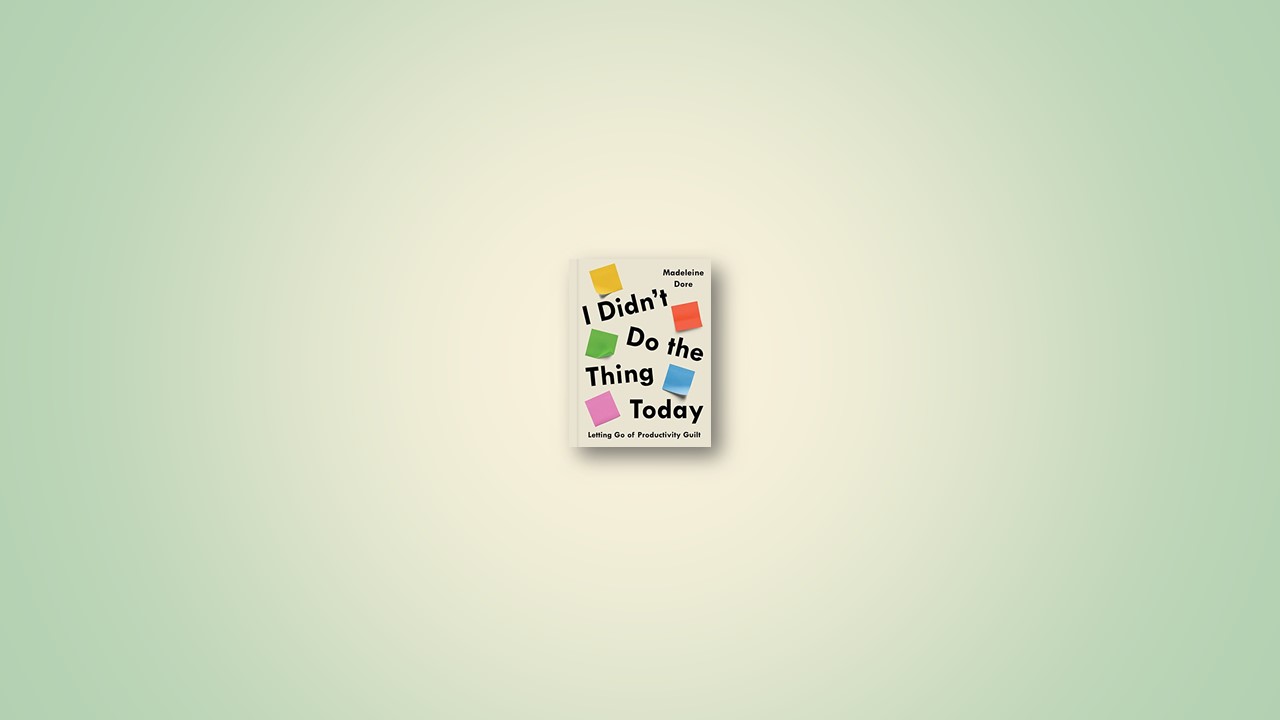THE NARROWING OF PRODUCTIVITY
So much of what we are trying to achieve in our days is bound to the idea that we can optimise things to the point of perfection. Surrounded by promises that if only we adopt this life hack or follow that morning routine we will finally get it all done, we look to this new thing to remedy our days like these. There can be a juicy pleasure in trying the latest hack, with its promise of improvement. I’ve made a hobby of it: I’ve eaten the frog, put butter in my morning coffee, bought the new planner, tried the miracle morning routine, set up rewards for good habits. These popular systems can be useful, and may even change your life, but I’ve found they can also create another thing to stumble over in our days.
We’re running just to stand still, and we’re missing the point. We’re doing all this work to improve ourselves, only to go on judging ourselves for being imperfect. Yet such a pursuit is a fool’s errand. The English word ‘perfect’ comes from the Latin verb perficere, which means ‘to finish, complete, carry out or achieve’. When we pursue perfection in our days and in ourselves, we’re creating an impossible standard. We’ve taken what’s incomplete as proof there is something wrong with us, when in fact being imperfect is an inevitable part of being human. We blame ourselves for not being exactly where we think we should be. We berate ourselves for inactivity. We shrink in our self-comparison to others. We doubt our decisions. We become so stifled by the pressure of being productive that we sometimes don’t do anything at all.
Rather than making us better, this ‘doing obsession’ leaves us feeling overwhelmed, burned out, dissatisfied, inadequate and alone. When others wear what they do as a badge of honour—talking in terms of busyness, of being flat out, of accolades and accomplishments—we feel inadequate by comparison, yet under pressure to do the same. Doing, doing, doing, all just to keep up, to prove we are worthwhile—yet we never quite feel that we get there.
THE HOPELESS SEARCH FOR THE IDEAL ROUTINE
In our culture that is obsessed with productivity, we tend to glorify routines and those who claim they can adhere to them perfectly. A routine is often touted as the salve to all kinds of dilemmas. Lost your job? Stick to your routine. Experiencing anxiety, depression or grief? Find a routine. Living through a pandemic? Get a new routine. But a routine is rarely the grand solution it promises to be, because it’s so hard to always uphold one in particular.
The aspirational routine to which we’re pinning our hopes of being better is more like a mirage. Although we strive for it, we rarely reach what it promises, and the reason for this is the variance inherent in our days—in our energy, in our interests, in our interactions, in our everyday chaos. A perfectly ordered life will always remain outside the imperfect reality of our daily lives.
How we can find our own way
- We can compose the day for ourselves, bucking the rigidity of routine in favour of being open to its ebb and flow.
- We might make checklists for our days or weeks, and allow them to be order-less reminders of what makes a good day.
- We might bookend the day with a way to begin and a way to end, creating a container for the muddle in the middle.
- We might alternate between early starts and sleep-ins, allowing our body to rest when it needs to, rather than be rattled by a too-early alarm.
- We might sometimes get to bed early to read, or at other times stay up late watching a new series, letting our interests or whims guide us.
- We might set aside an untouchable day each month to do something that fulfils us, or create a pocket in the day just for that.
THE WORRY OF WASTED TIME
We must be willing to work at things that are worthwhile for a long time, and often without the perks of instant gratification. In doing so, we become more familiar with the length of time it takes to do worthwhile things—and with how everything has its own pace. As Henry David Thoreau wrote in his journals, ‘Consider the turtle. Perchance you have worried yourself, despaired of the world, meditated the end of life, and all things seemed rushing to destruction; but nature has steadily and serenely advanced with a turtle’s pace. Has not the tortoise also learned the true value of time?’
‘Considering the turtle’ means that we can not only be more patient with time, but perhaps also more realistic about what we expect from the hours in our day.
We often ask ourselves where the time goes, and no one really knows. But for things to be worthwhile, for making good times, for things to be timeless, we have to allow them to take the time they take. This doesn’t mean that we have to make them perfect, or wait for the perfect moment, or be perfectly optimised. The fruits of our labour might not reveal themselves in a day—some days it can look like we didn’t do anything at all—but the knowledge we put in the bank is priceless. So trust the timing of things—trust the timing of your life.
THE SHIFTING GOALPOSTS OF AMBITION
It’s human nature to keep seeking out the next step—it’s what can provide momentum and drive progress—but perhaps we can sometimes take a moment to survey the view from wherever we stand. After all, what happens during the in-between moments of our lives is the very making of our lives. There is no end point to our days while we are living them. Once we arrive at the end of one, we find ourselves at the starting point of another—and what happens in the middle is what we call a life.
So rather than being stuck on the treadmill of the next thing and the next thing, we should be inspired regularly by what we have learned, and reflect on what we could do differently, how we have felt, what we have enjoyed or experienced, and how we have changed.
Ambition itself is not a character flaw—it can guide and propel us. But when we use it to fill our internal sense of emptiness, we run in circles. Instead of asking what ambition, what goal, what achievement will make us special—and make us feel whole—we can keep jostling with the incomplete parts of ourselves. We can stop worrying about how the rest of our lives will turn out, and simply get through the smaller challenges we will encounter today. We live in this day, after all, not in the one we’re waiting for.
THE MYTH OF BALANCE
In the film Princess Cyd, sixteen-year-old Cyd is in the kitchen with her aunt, Miranda, tidying up after a dinner party. Miranda reaches for a piece of leftover cake for herself and also offers Cyd a slice, to which Cyd replies: ‘Maybe if you had more sex, you wouldn’t eat so much cake.’ The words are accidently cruel, but they also suggest there are rules to the pleasures we add to our lives. What gives meaning or a sense of fulfilment to one person’s day might be completely overlooked by another. Yet we see common prescriptions to find this elusive balance all the time—try mindfulness, do a yoga class, eat less cake. We forget that it’s not a moral failing to enjoy one pleasure but not another, to have one burner on but not another, to be one way and not another. We can find our own version of fulfilment—from an afternoon spent reading or by having a piece of leftover cake. After all, as Miranda reminds young Cyd: ‘We are different shapes and ways and our happiness is unique. There are no rules of balance.’
It’s an important reminder not only to reserve self-judgment when we wobble, but to reserve judgement about somebody else’s wobble—the notion of balance, enjoyment and how we look after ourselves looks different for everyone. Even more reason to find what works for us. Instead of trying to follow someone else’s rules or getting caught up in our own, we can seek things that feel congruent with who we are at this moment in time, and wobble as we discover more. We can allow our days to unfold with curiosity rather than judgement.
Life is movement, not stagnant balance. Enjoy the slice of leftover cake, enjoy the moments by yourself, enjoy the squeeze, enjoy the absorbing, and enjoy the soup and the biscuits. Be all and everything, or all or nothing. Enjoy whatever is your particular way of wobbling through your days, and learn to value the variety.
THE MOMENTS OF ENJOYMENT
We are never going to reach a point where our days are without drama, without friction, without cracks. Our days won’t someday be smoothed over, full of ecstasy and elation—or perhaps completely calm and serene, if that’s more your thing. There will always be stumbles, and we may as well navigate the day with them because that’s the only way we can fully step into our lives.
Otherwise, what are we waiting for? We cannot wait until we’re perfect, until we’ve got through our to-do list, until we’ve streamlined our routine, until we’ve fulfilled all our goals, ambitions and dreams—our real life is unfolding now. Perhaps that’s our task as day artists—to strive to realise that each day is a little life, to remember that this very day is not a dress rehearsal, or to cultivate a small part of us that does.
Even if you didn’t do the thing today, find something to enjoy
- Enjoy the failures and mistakes—they’re a sign we’re trying.
- Enjoy the unknown—it’s where we discover something new.
- Enjoy the rest, the boredom, the empty moments—that’s where we find insight.
- Enjoy the busy, too—that’s where we can find momentum.
- Enjoy the rut—that’s where we can discover a new path.
- Enjoy the wobble—that’s where we find the variances that light us up.
- Enjoy the learning—it’s where we can never fail.
- Enjoy the limitations—it’s where we find awe and creativity.
- Enjoy the choices we make as well as the plans that change—they’re often the making of our lives.


